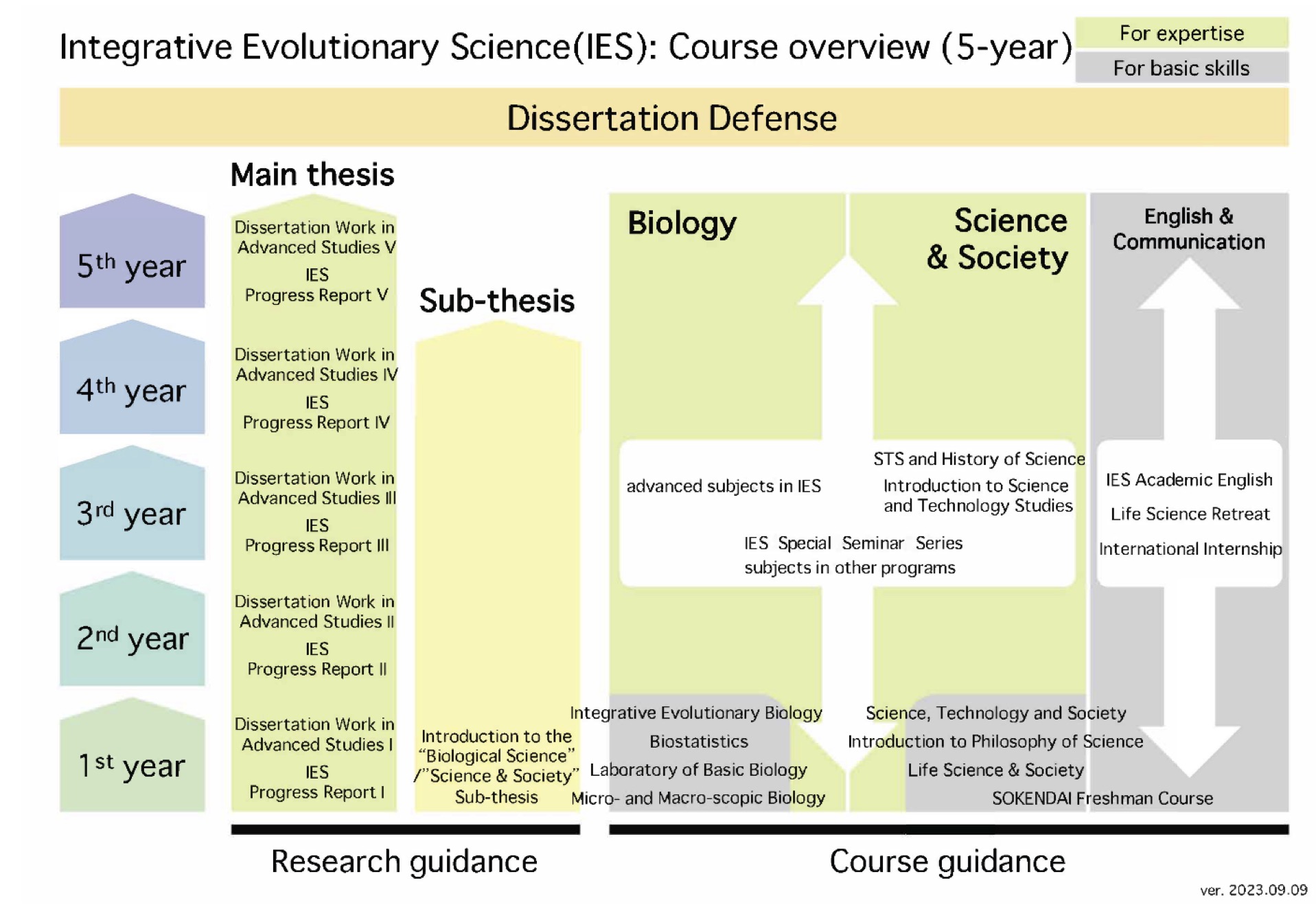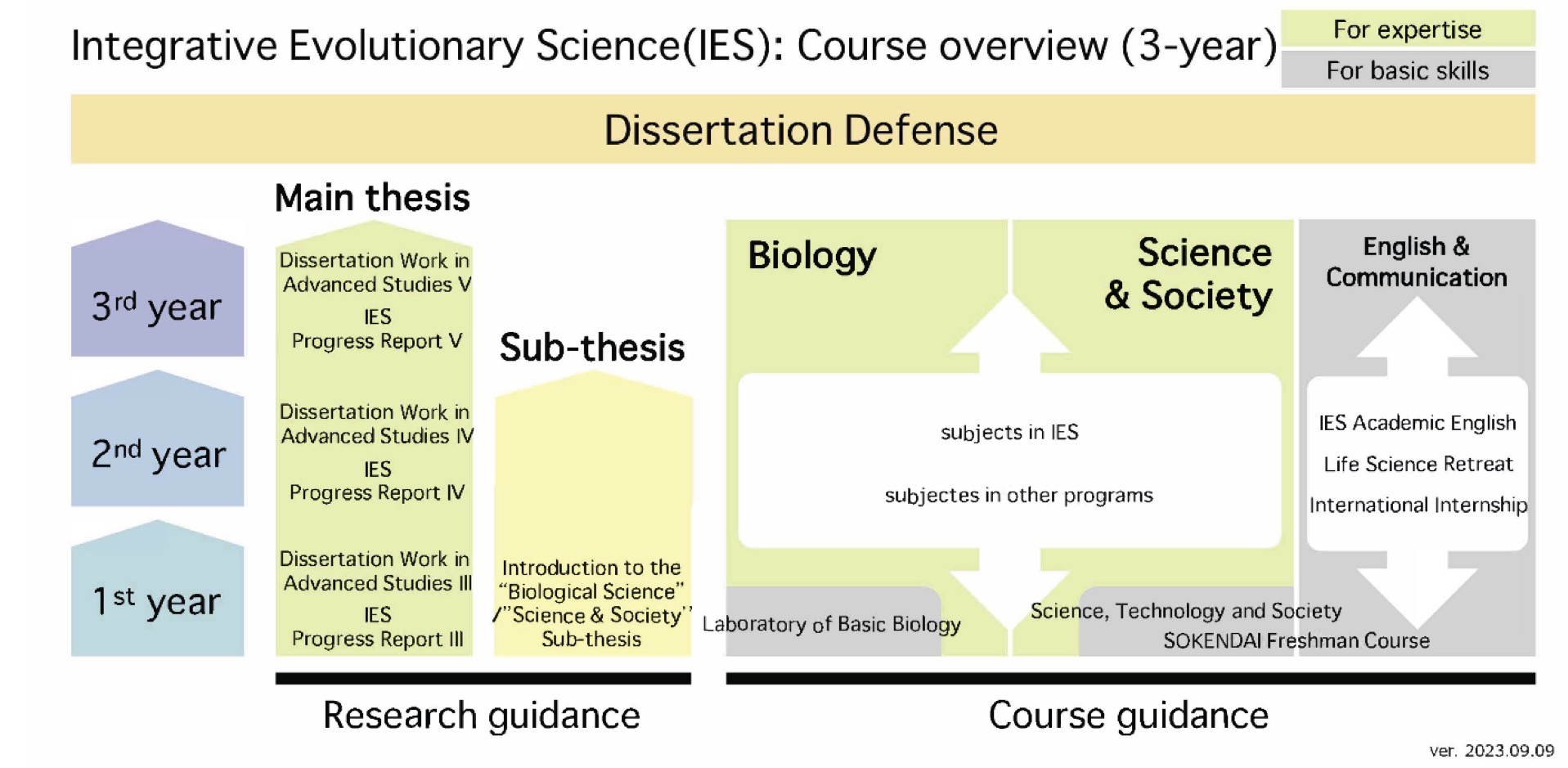Entrance Examinations
Application guideline for 2025 Admission is here.
For Prospective Students
Type of Students We Seek
・ Students who are willing to explore life phenomena, from molecules to ecosystems, broadly and in depth from an evolutionary perspective.
・ Students who are willing to explore science and its relationship with society broadly and in depth.
・ Students who aim to be an active researcher or highly skilled professional with an international perspective.
・ Students who have a wide range of interests beyond their specialized area, in addition to basic academic skills in their own field.
Selection of Students for Admission
The screening will be carried out based on a comprehensive evaluation of the applicant's
basic knowledge of the field they wish to pursue in this program, as well as their
ability to think logically, willingness to conduct research, communication skills
(including English), and aptitude as a researcher, based on the application documents
and interview.
In addition to the above, the specificity and feasibility of the research to be
conducted after admission and the ability to carry it out will also be evaluated for
applicants to the three-year doctoral program.
Aims for Doctoral Candidates
This program aims to nurture the following graduates who can play an active role in society in the next generation through their expertise in integrative evolutionary science.
・ Students with outstanding expertise and ability to lead world-class research in the future in either evolutionary biology or science and society.
・ Students who can discover new issues and methodologies on their own, by applying the knowledge of integrative evolutionary science, and who can pioneer an academic field outside the existing frameworks.
・ Students with a broad perspective on scientific research and can consider the nature of science and its role in society from a comprehensive viewpoint.
・ Students with high communication skills, including English proficiency, and who can play an active role on the international stage.
Learning and Research Activities
Students in this program will conduct the following academic and research activities to acquire competencies appropriate for the doctoral degree.
Five-year doctoral program
- Through the SOKENDAI Freshman Course, students will develop research ethics and communication skills essential for researchers and professionals.
- Students will acquire basic knowledge and skills in biology through the following courses: Micro- and Macro-scopic Biology, Integrative Evolutionary Biology, Laboratory of Basic Biology, and Biostatistics.
- Students will acquire the ability to deeply consider the nature of science and the relationship between science and society through the following courses: Introduction to Philosophy of Science, Science, Technology and Society, and Life Science & Society.
- In the first year, students participate in laboratory rotations (Dissertation Work in Advanced Studies IA and IB). Students will have about one month of research experience in each of the laboratories they choose, where they will be exposed to a wide range of academic fields and determine the theme of their doctoral dissertation research.
- By the second semester of the first year, students will begin their doctoral dissertation research under a multiple-supervisor system that consists of one main supervisor and two or more sub-supervisor (Dissertation Work in Advanced Studies IB-VB). At the semi-annual Integrative Evolutionary Science Progress Report, students present the progress of their research and receive advices from faculty members and their supervisors. Through these activities, students can complete highly original doctoral dissertation research from a broad perspective.
- Students will learn cutting-edge knowledge in the fields of biology and science and society and acquire a high level of expertise through the following advanced courses: Introduction to Science and Technology Studies, STS and History of Science 1-3, and Integrative Evolutionary Science Special Seminar Series.
- Students will expand their knowledge of related fields by taking subjects from 19 other programs according to their own interests and specialties.
- Students will improve their communication skills, including English proficiency, through the following courses: Integrative Evolutionary Science Academic English (Basic/Advance), Life Science Retreat, and Integrative Evolutionary Science Progress Report.
- Students must submit a sub-thesis as a requirement for the dissertation. Students will first learn how to proceed with the writing of their sub-thesis in Introduction to the Science & Society Sub-thesis or Introduction to the Biological Science Sub-thesis. In the actual writing of the sub-thesis, students in the field of biology will be guided by faculty members in science and society, and students in the field of science and society will be guided by faculty members in biology.
Three-year doctoral program
- Through the SOKENDAI Freshman Course, students will develop research ethics and communication skills essential for researchers and professionals.
- Students will acquire basic knowledge and skills in biology through courses such as Laboratory of Basic Biology.
- Through courses such as Science, Technology and Society, students will acquire the ability to deeply consider the nature of science and the relation between science and society.
- Immediately after enrollment, students begin their doctoral dissertation research under a multiple-supervisor system that consists of one main supervisor and two or more sub-supervisors (Dissertation Work on Advanced Studies IIIA-VB). At the semi- annual Integrative Evolutionary Science Progress Report, students present the progress of their research and receive advice from faculty members and their supervisors. Through these activities, students can complete highly original doctoral dissertation research with a broad perspective.
- Students will expand their knowledge of related fields by taking courses from 20 programs, according to their own interests and specialties.
- Students will improve their communication skills, including English proficiency through the following courses: Integrative Evolutionary Science Academic English (Basic/Advance), Life Science Retreat, and Integrative Evolutionary Science Progress Report.
- Student must submit a sub-thesis as a requirement for the dissertation. Students will first learn how to proceed with the writing of their sub-thesis in Introduction to Science & Society Sub-thesis or Introduction to the Biological Science Sub-thesis. In the actual writing of the sub-thesis, students in the field of biology will be guided by faculty members in science and society, and students in the field of science and society will be guided by faculty members in biology.
A sample course of study
The following diagram shows a sample course of study. Students can choose a combination of various subjects according to their interests and specialties while preparing their main thesis (doctoral dissertation) and sub-thesis.


Obtaining a Degree
To obtain a doctoral degree, students must earn the prescribed credits and pass the examination of their sub-thesis. The research comprising the doctoral dissertation must be published in an academic journal with an established peer-review system or equivalent. The students must be the first author of at least one paper.
The doctoral dissertation is first reviewed by the program evaluation committee, which includes an external examiner. This examination includes an oral presentation and a question-and-answer session at a public thesis presentation and an oral examination. Upon passing this examination and obtaining approval from the Representative Committee (Life Sciences field or Cultural and Social Studies field), the student is awarded the degree of Doctor of Philosophy (in Japanese :Rigaku理学 or Gakujutsu学術).
In the five-year doctoral program, students can obtain a master's degree if certain conditions are satisfied.

